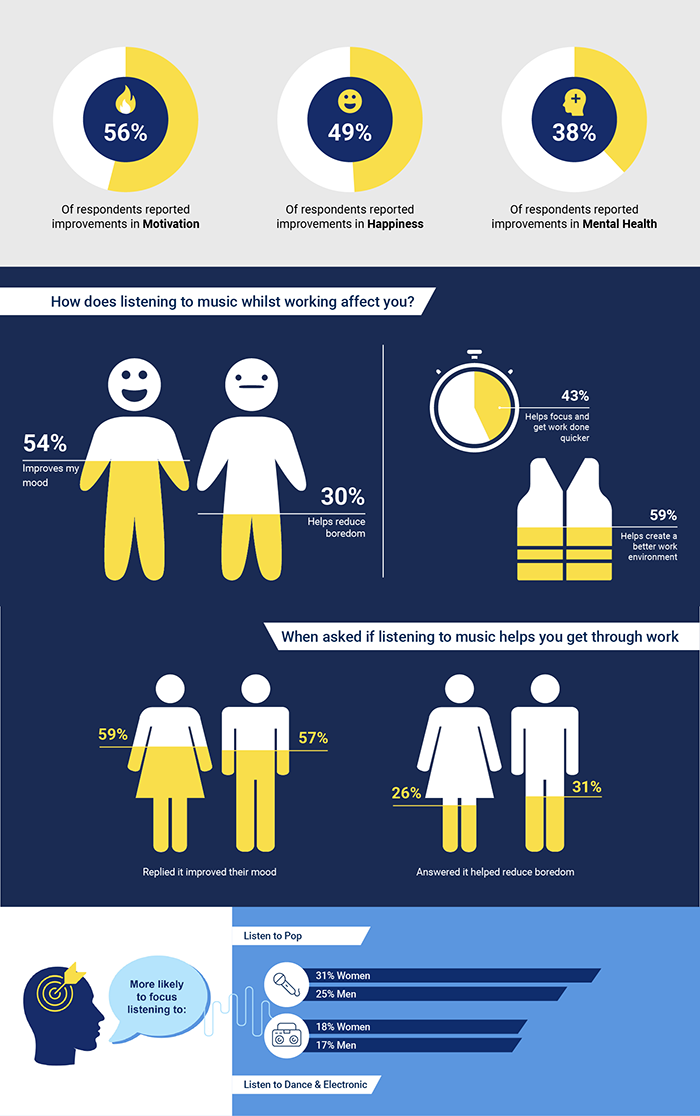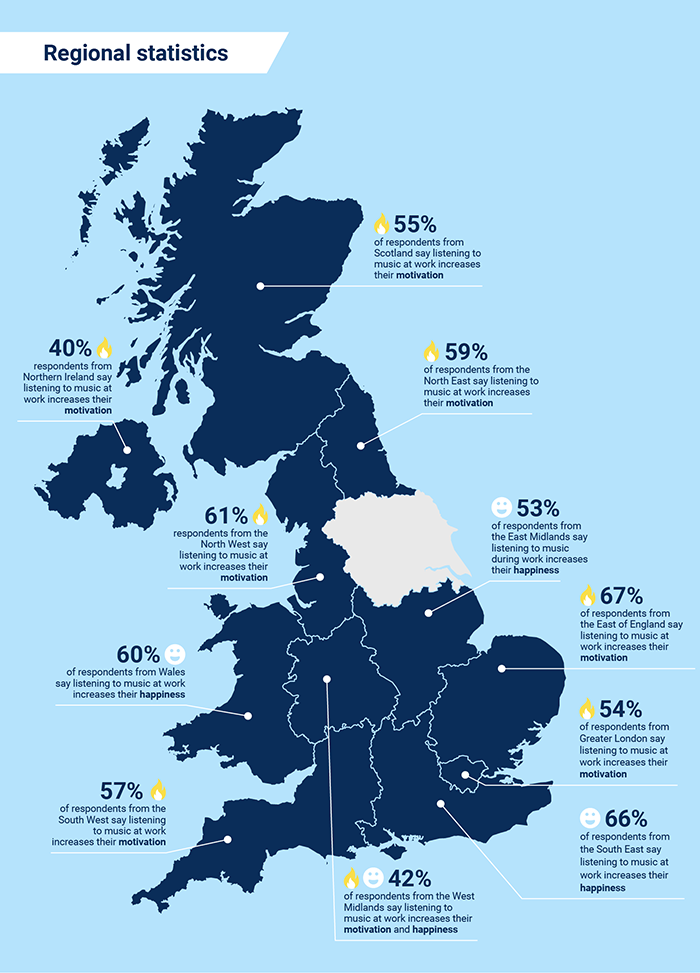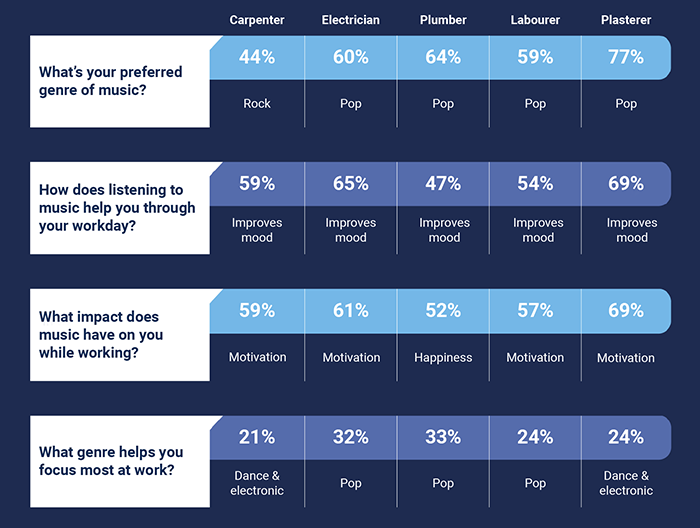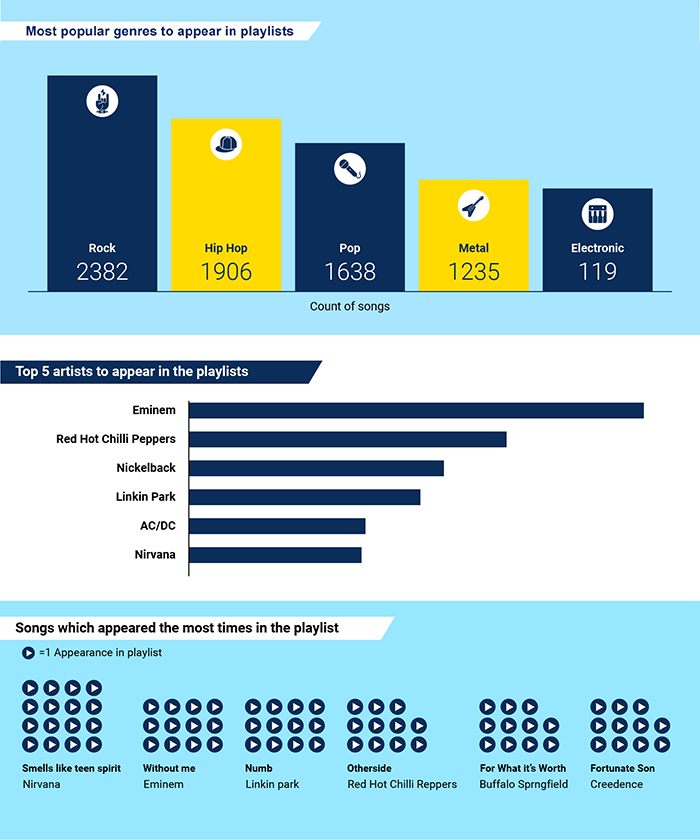The Impact Music Has on Workers
Music and Construction: The Trends and Impact Music has on Workers
Our latest survey uncovers why music matters to construction workers
When Monday rolls around, construction workers press play on the tunes that will motivate and keep them company throughout their working week.
But which genres get the most airtime on site? How do workers like to listen to their chosen playlist or radio station; and how does it support their productivity and mental health while they’re on the job?
The team at Towergate analysed 30 Spotify playlists linked to construction workers (titles included builders, building, construction, contractor and job site), and surveyed 500 UK construction workers, to give construction employers the latest insight into on site behaviours when music is part of the job.
We last did this research in 2021, so we’ll also explore how the intersection of music and onsite work environments has evolved.
How music affects workers in construction
Our brains love music. It triggers happy feelings, lowers our stress levels and even helps improve our memories. The benefits of listening to music are widely known, but how does it help us while we are at work?
Our 2024 results reveal the top positive affect music has on construction workers is it improves their mood (57%), followed by 42% claiming it creates a better work environment, and thirdly - that it makes the time goes faster (41%).
The big top three positive impacts music has on this sector’s workforce is motivation (56%), bringing feelings of happiness while they work (49%), and giving them energy (42%), completes the top three benefits of having the tunes playout while on the job.
Interestingly, it’s the men that gain more energy for their tasks through music at 44%, while the ladies need tunes a little less for energy with 32% saying this.

The effect listening to music at work has on us
How does the construction sector listen to music throughout the week?
An important factor for enjoying music while at work, but staying safe and social with their colleagues, 63% of people we surveyed play their music out loud (on the radio), with 83% of people aged 55 and over choosing this method.
Just 24% of workers enjoy their music with headphones on, and the radio reigns supreme as the top way of listening to music at work with 59% tuning in, followed by Spotify (44%), and YouTube as third choice (32%).
Workers know the importance of health and safety on site, with a number of jobs recognised as ones they wouldn’t do while listening to music, including operating heavy machinery (36%) and completing electrical work (23%). For jobs like these, it’s important that music doesn’t distract from sounds like alarms or workers needing help.
Which genre of music hits all the right notes for workers?
When it comes to the all-important type of songs to work to, it’s Pop music that takes the number 1 slot as the workers’ favourite with over half the vote (52%), followed by Rock (36%) EDM (electronic dance music) next at (32%), Indie music (18%), Country (12%) and finally Classical music (7%) closes.
Christmas spirit is also a big yes on site, with over 60% of people surveyed wanting to listen to Christmas songs for the whole month of December.
No two days are the same when it comes to the type music people want to listen to. When asked what they like to each day of the week, responses were mixed. Respondents said “Happy music on a Friday”, ‘Dance music on a Friday - chilled out songs on a Monday”, “Different playlists each day so I don’t get bored”, but there is an overall trend of playing happy, uplifting or dance tracks on a Friday as the working week comes to a close.
Music at work: The regional statics
Which part of UK feels most motivated by music? We can tell you how music impacts constructions workers country wide as we break down key data into regions.
Music has the most impact on those from the East of England, where 67% of workers say that it helps to increase their motivation. In contrast, only 40% of workers in Northern Ireland say the same.
Music at work: The job sector split
Looking at different roles with neighbouring skilled workers including Carpenters and Plumbers and their answers around music at work.
Spotify and Construction: The hits
Our Spotify results reveal the all-important most popular artists, songs, playlists and the top decade of music the construction sector are pressing play on.
Overall, Rock is the most listened to genre of music, and the top artist? It’s Eminem scoring over 100 playlist adds. And construction like to keep it current, with the 2020s being the top decade they listen to.
Whatever type of construction site people are working on one thing is clear, music is good for the environment, productivity, and the happiness and mood of everyone while working.
So whether a workforce is large and nationwide, or a trusted local small business keeping the team happy will benefit the contract in a number ways, and music seems to be a simple choice for any type of site.
Protect yourself with tradesman insurance
It may sound simple but protecting yourself with adequate tradesman insurance is one of the most important things you can do for your reputation. If things go wrong with a job, the right tradesman insurance cover can provide protection against accidental damage and injury caused to the public whilst you’re carrying out your work.
When it comes to tradesman insurance, one size doesn’t fit all. You’ll be able to take out tailored cover that meets your specific requirements and includes liability covers that work for you. Take a look at tradesman insurance options from Towergate or contact our expert team on 0330 808 8237 to discuss your needs.
About the author
 Alison Wild BCom (Hons), FMAAT, MATT, Taxation Technician is a highly respected industry professional who has been working with and advising SMEs in areas including tax, pensions, insurance and marketing for over 25 years. She is a Fellow member of the Association of Accounting Technicians (AAT) and Association of Tax Technicians (ATT) and also has 20 years' experience as a residential landlord.
Alison Wild BCom (Hons), FMAAT, MATT, Taxation Technician is a highly respected industry professional who has been working with and advising SMEs in areas including tax, pensions, insurance and marketing for over 25 years. She is a Fellow member of the Association of Accounting Technicians (AAT) and Association of Tax Technicians (ATT) and also has 20 years' experience as a residential landlord.
Methodology and sources
Towergate Insurance conducted a study exploring the impact that music has one those working in the construction industry, their listening preferences and the types of music that they like to listen to. The first part of the study was a survey of 500 construction workers in September 2024, followed by an analysis of 30 Spotify Playlists related to construction workers (any that had titles to do with construction, builders, building, contractor, job site).
Consistent with our policy when giving comment and advice on a non-specific basis, we cannot assume legal responsibility for the accuracy of any particular statement. In the case of specific problems we recommend that professional advice be sought.
Consistent with our policy when giving comment and advice on a non-specific basis, we cannot assume legal responsibility for the accuracy of any particular statement. In the case of specific problems we recommend that professional advice be sought.
Date: November 06, 2024
Category: Trade















